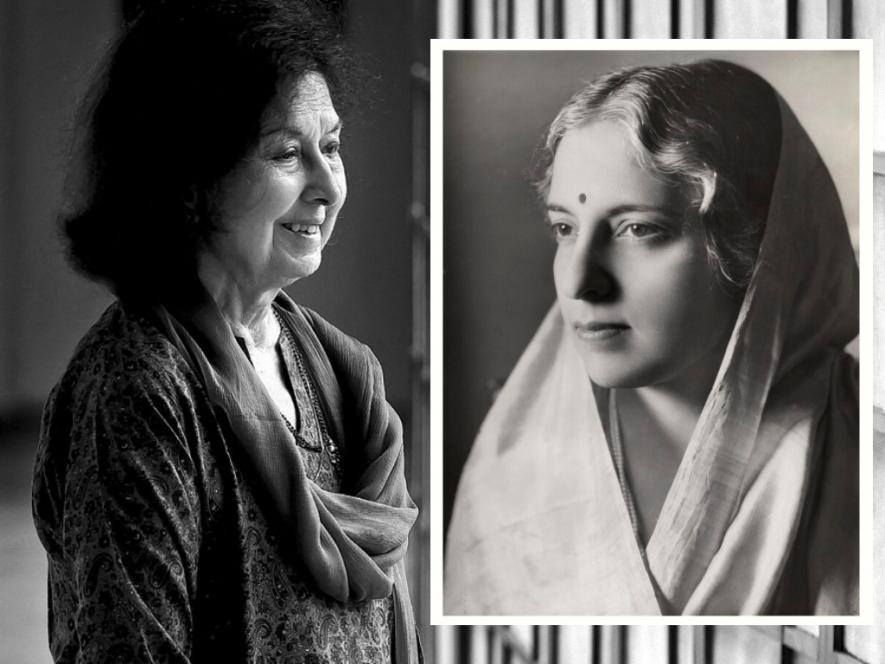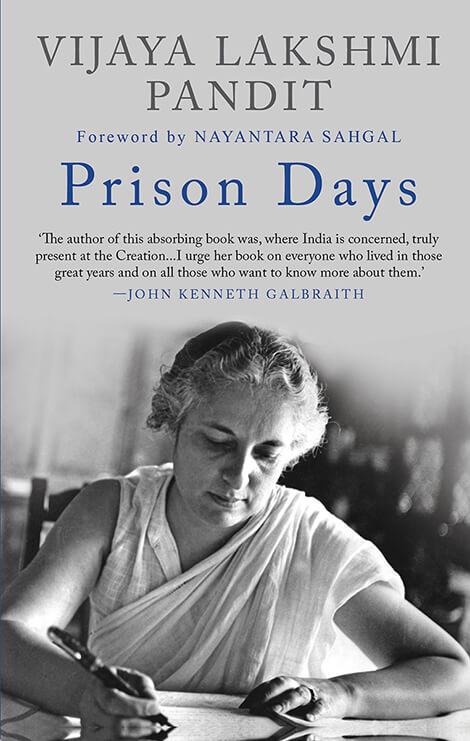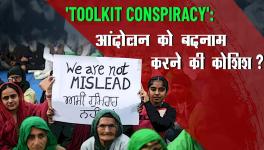“She Kept a Diary to Keep Herself Going…”

Nayantara Sahgal (left) and Vijaya Lakshmi Pandit (right)
When Mahatma Gandhi gave the call for the nation to join in the freedom struggle, Vijaya Lakshmi Pandit threw herself wholeheartedly into the Movement, along with her father Motilal Nehru, brother Jawaharlal, and husband Ranjit Sitaram Pandit. With a foreword by her daughter Nayantara Sahgal, Prison Days is the account of her third and final term in Naini Central Jail in Allahabad.
In this diary, Pandit recounts her experiences in jail and the hardships she endured along with others who had joined the fight for freedom: rations mixed with dirt and stones, a lack of water and sanitary facilities, surviving on an allowance of 9 annas a day, and only the hard ground to sleep on.
The following is a short conversation with Nayantara Sahgal about Vijaya Lakshmi Pandit's time in prison along with excerpts from the book.
Indian Cultural Forum (ICF): The 1946 Signet Press title of this book was My Prison Days. Do you think your mother meant it as a contribution to the family record as much as the public one? Being held at Naini jail was almost a rite of passage with your family. In 1942, your mother meets several inmates from her previous stay there, while your father discovers the remnants of some gardening he had done. Did memories of jail, of those characters and experiences, figure much in the table-talk at home? Did companions from prison reappear in later life?
Nayantara Sahgal (NS): It is important for anyone today to understand that jail was in no way a convivial experience. If and when the inmates met again, it was not necessarily as friends. Jail was grim, haunting, desolating. Mother did not keep a diary for any public purpose – in fact, not for any reason but to keep herself going. And No, jail did not figure in home chat. Home time was precious, with parents and children together after long, repeated, hard-to-bear separations. It was precious time to be a "normal" family. Mother had three jail sentences, father had four, and died of his fourth imprisonment. Together it amounted to seven to eight years in jail.
ICF: This has to be one of the earliest prison journals by an Indian woman. Your mother captures the way women in jail are treated, as a lower priority than male inmates. The food is cooked in the men's section and sent over to the women as an afterthought. They are made to live in derelict structures, subject to intrusive male oversight. Their children are raised in jail and neglected by the state. What part did a feminist awareness play in your mother's public life?
NS: No "feminist" awareness — the word did not exist. But there was huge awareness of the lack of women's rights from, I think, the early 20th century on, perhaps earlier with famous women reformers. Organisations like the All-India Women's Conference (AIWC) of which Mother served as President, for instance, were definitely aware of the need for women’s rights. There was also the UN Commission on Human Rights, where Hansa Mehta changed "all men are created equal" to "all human beings" in the Universal Declaration of Human Rights. The fact that Mother had so many firsts – first woman Cabinet Minister, first woman ambassador, first woman to lead delegations to the UN General Assembly, first woman to be elected President of the UN General Assembly, served to highlight the lack of women's rights generally. I have to add that in Mother's family, the men — her brother, her husband — were feminists.

Image courtesy Speaking Tiger
From Prison Days:
19th August 1942
The common idea about prison seems to be that it is a place where one is exceedingly lonely. Lonely one does feel as in the wrong kind of crowd, but not alone. In no other place have I longed so much for solitude as I have done since coming here a week ago. From dawn to dark there is hardly a moment when I am by myself. Everybody is interested in me, everybody wants to pour out her tale of woe in the hope that I can help her to get out of this place. The noise, complaints about each other, quarrels and free fights—to say nothing of the abuse which is hurled back and forth, is very wearing to the nerves. Even the night is full of sounds—not little, unexpected noises such as one hears outside, but the harsh monotonous constantly repeated noises that jar on the nerves. As Ernst Toller has said about jail in one of his letters: ‘Day after day chains of sound are strangling you with their dissonance.’ Only those who have been prisoners can understand fully what this means. Of course the noises and lack of privacy seem worse in the beginning; as time goes on one is able, by an effort of will, to keep all the noises away. I have been able to isolate myself completely from a whole barrack full of talking, quarrelling women and carry on the thread of my book as if I was alone. But this takes time and there must be a certain amount of mental calm which, at present, I do not possess.
This place assumes gigantic proportions at night—the tiny flickering light of my jail lantern casts long and weird shadows which have a ghostly appearance. I sit and look at them and weave stories to amuse myself.
[…]
My yard contains one other barrack which is empty at present. There is another yard separated from mine where the convicts live. There are about forty-four women only, as this is a very small jail. They are all habituals and some of them are old acquaintances having been here during my last imprisonment. They are not permitted to come into my yard unless something special has to be done. But when the door between the two yards is open, we exchange greetings and they give me friendly smiles and ask an occasional question about the children, of whom they have heard from me on previous occasions. In the other yard also are the solitary cells. The sight of these always upsets me— they are unfit for any human being to be locked up in. There is a woman there now—I have not been able to find out her offence but I can hear her wailing at intervals throughout the day and night. It is a horrible sound—the wail of a prisoner who has lost all hope and is afraid.
Durgi has been telling me the story of her life. It is a common one—she killed her husband because he neglected her, thrashed her and did not give her enough to eat. She gives me gruesome details of the murder and appears to get a lot of satisfaction from the recital. I try to analyze her feelings later and come to the conclusion that the main cause for her satisfaction is the fact that by killing the husband she has been able to strike a blow at the mother-in-law whom she still hates. She left a little boy of two years at home and came to prison with a baby girl of six weeks who has recently died. Durgi is passionately fond of children and is very cut up at the loss of the child whose death she attributes to black magic. Nothing I can say to the contrary will convince her. She sometimes cries for her son who is now nearly eleven years old and whom she has never seen since her imprisonment.
The number of frogs in this yard is unbelievable. They are all over the place—great big ugly creatures and incredibly foolish looking. They remind me of war profiteers—those smug people who are so content with the little circle in which they move that they completely forget there is a world outside it. In the evening when the frogs begin to croak I get quite exhausted. Sometimes there is a solitary croak and at other times a regular chorus which increases in volume and drives one crazy. Yesterday I stepped out of bed hurriedly and without looking down put my foot on a big toad! It was rather awful—but he survived and hopped out into the yard.
[…]
7th September 1942
Monday again! Parade day seems to come round with great rapidity, but looking at the calendar one doesn’t seem to have advanced very far!
This evening, the matron was walking with me in the yard before lock-up and described the heroism of a young Russian girl who was one of a guerilla band. She was impressed with the way in which she cut telegraph wires and tampered with railway lines and burnt several wayside stations, etc. At the end of the story I could not resist saying, very quietly, ‘Those are some of the charges against Janki, only in the language of the foreign government in this country, it is called arson and treason, not heroism. We get a seven-year sentence for it even when sufficient proof is not available.’
Naturally the conversation died after this.
These are excerpts from Prison Days written by Vijaya Lakshmi Pandit, with a foreword by Nayantara Sahgal and published by Speaking Tiger. Republished with permission from the publisher.
Born at the turn of the twentieth century, in 1900, Vijaya Lakshmi Pandit played a key role in India’s freedom struggle. In 1953, she became the first woman President of the United Nations General Assembly. She also served as the Governor of Maharashtra from 1962 to 1964, after which she was elected to the Lok Sabha. Her writings include So I Became a Minister and The Scope of Happiness: A Personal Memoir.
Nayantara Sahgal is the author of several works of fiction and non-fiction, the first of which, Prison and Chocolate Cake, an autobiography, was published in 1954. She returned her Akademi Award in 2015 in protest against the murder by vigilantes of three writers, and the Akademi’s silence at the time. She has been a Vice President of the PUCL (People’s Union for Civil Liberties) and is engaged in an ongoing protest against the assaults on the freedom of expression and democratic rights.
Get the latest reports & analysis with people's perspective on Protests, movements & deep analytical videos, discussions of the current affairs in your Telegram app. Subscribe to NewsClick's Telegram channel & get Real-Time updates on stories, as they get published on our website.
























